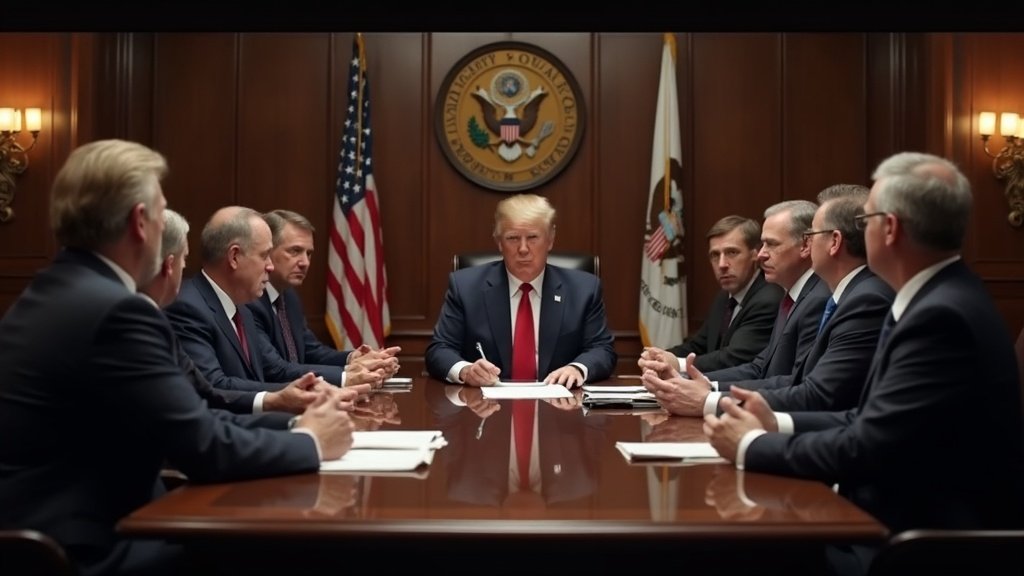A Political Order to Address ‘Debanking’
U.S. President Donald Trump is set to sign an executive order aimed at federal bank regulators, instructing them to identify and fine financial institutions that have engaged in “debanking.” This practice, where banks deny services to certain businesses, has been a central concern for various political and industry groups, including gun manufacturers, fossil fuel companies, and crypto firms.
The executive order, according to a senior White House official, will require regulators to review complaint data and instruct Small Business Administration-affiliated financial institutions to work on reinstating clients who were unlawfully denied banking services. This move represents a significant political effort by the administration to protect what it sees as disfavored industries.
The History of “Debanking” and Operation ChokePoint
The issue of debanking is not new, and the executive order comes in the wake of a controversial past. During the previous administration, a new initiative dubbed “Operation ChokePoint 2.0” was alleged to be a concerted effort to push crypto businesses out of the U.S. and offshore. While officially denied, these allegations became a rallying cry for pro-crypto advocates and conservative groups, who saw it as an attempt to stifle innovation and legitimate businesses for ideological reasons. This historical context provides the backdrop for Trump’s executive order, which seeks to reverse this perceived trend and create a more open and fair banking environment for all lawful industries.
Eliminating “Reputational Risk” from Regulatory Guidance
According to Bloomberg, a key component of the new executive order will be to instruct regulators to eliminate the “reputational risk” category from their guidance and training materials. This is a significant move, as critics have long argued that this ambiguous category was used to unfairly target and debank crypto companies.
By removing this subjective metric, the administration aims to force banking decisions to be based on more objective, individualized, and risk-based analyses. This could have a profound impact on how financial institutions assess new clients, potentially making it easier for crypto companies to secure and maintain banking services without fear of being denied for a perceived “reputational risk.”
Traditional Banks’ Push to Block Crypto Applications
In a direct counter-move to the administration’s efforts, a coalition of powerful bank associations is actively trying to block various crypto companies from obtaining banking licenses. A letter dated July 17, sent to the Office of the Comptroller of the Currency (OCC), shows associations like the American Banking Association and others are attempting to block applications from four digital asset providers, including Ripple and Fidelity. Their primary argument is that there are “significant policy and legal questions” regarding the proposed business plans of these applicants and that the public portions of their applications lack “meaningful public scrutiny.” This action highlights a clear clash of interests between traditional financial institutions and the emerging crypto sector.
The Race for Banking Licenses
The efforts of the bank associations come at a time of a growing “banking arms race” between traditional financial institutions and native crypto firms. Companies like Ripple, the creators of XRP, and Circle, the issuer of the stablecoin USDC, have both filed for national trust bank charters. Ripple’s application was filed on July 2, days after Circle filed to create a national trust bank to manage its stablecoin reserves. These applications underscore the intensifying competition within the financial services industry, where crypto firms are seeking direct access to the traditional banking system to streamline operations, reduce costs, and enhance their legitimacy in the eyes of institutional investors and regulators.
Stablecoins and the GENIUS Act
The competition and new regulations are particularly relevant for stablecoin companies. Stablecoins have introduced new forms of payments that directly compete with the infrastructure provided by traditional banks and credit card companies. The GENIUS Act, a U.S. bill designed to regulate stablecoins and their issuers, was signed into law on July 18. This legislation provides a clear regulatory framework, legitimizing stablecoin issuers and their operations. The passage of this act, combined with the applications for banking licenses, suggests that crypto firms are serious about integrating with the traditional financial system, forcing a reckoning between new and old forms of finance.
The Growing Overlap and Intensifying Competition
The conflict between the Trump administration’s executive order and the banking associations’ letter to the OCC is a clear sign of a growing overlap and intensifying competition between traditional finance and native crypto firms. The dispute is not just about a few companies or a single policy; it’s about the future structure of the financial services industry.
The Trump administration is advocating for a more permissive and inclusive environment, while traditional banks are attempting to use existing regulatory and legal channels to protect their market share and influence. The outcome of this struggle will have profound implications for the future of banking services for crypto firms and could reshape the financial landscape.
A New Era in Financial Regulation
Donald Trump’s executive order on “debanking” marks a significant move to protect industries, including crypto, from what the administration perceives as unfair treatment by financial institutions. However, this policy is met with direct resistance from powerful bank associations, who are actively working to block crypto companies from obtaining banking licenses.
This clash highlights the intense competition and growing overlap between traditional and decentralized finance. The resolution of this issue, along with the recent passage of the GENIUS Act, will play a crucial role in determining the future regulatory landscape, signaling a new era in which digital asset firms seek to become an integrated and legitimate part of the mainstream financial system.
Read more: Trump’s Crypto Portfolio: How Digital Assets Drive a New Business Empire























